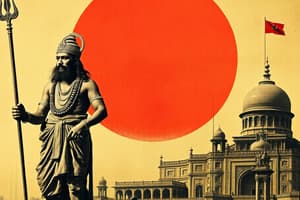Podcast
Questions and Answers
What is the date commemorated as Shivaji Jayanti by the Government of Maharashtra?
What is the date commemorated as Shivaji Jayanti by the Government of Maharashtra?
- 1 January
- 25 March
- 10 November
- 19 February (correct)
Which fort was given to Shivaji's family for residence around 1590?
Which fort was given to Shivaji's family for residence around 1590?
- Fort Kalyan
- Fort Rajgad
- Fort Shivneri (correct)
- Fort Purandar
Who was Shivaji's father and what was his role?
Who was Shivaji's father and what was his role?
- Maloji Bhonsle, a tax collector for the Mughals
- Shahaji Bhonsle, a Maratha general serving the Deccan Sultanates (correct)
- Adilshah, the ruler of Bijapur
- Lakhuji Jadhavrao, a Mughal-aligned sardar
What role did Shahaji Bhonsle have in relation to the Bijapur Sultanate?
What role did Shahaji Bhonsle have in relation to the Bijapur Sultanate?
What significant action did Shivaji take at Torna Fort in 1646?
What significant action did Shivaji take at Torna Fort in 1646?
Which crucial areas did Shivaji bring under his control after capturing several forts?
Which crucial areas did Shivaji bring under his control after capturing several forts?
What prompted Shahaji to shift his loyalty among the different Sultanates?
What prompted Shahaji to shift his loyalty among the different Sultanates?
What was Shahaji's attitude toward the Mughal Empire?
What was Shahaji's attitude toward the Mughal Empire?
What significant title was given to Maloji, Shivaji's grandfather?
What significant title was given to Maloji, Shivaji's grandfather?
How did Shivaji first challenge the Bijapuri government?
How did Shivaji first challenge the Bijapuri government?
What significant event occurred in 1674 regarding Shivaji?
What significant event occurred in 1674 regarding Shivaji?
Which empires and powers did Shivaji engage with during his rule?
Which empires and powers did Shivaji engage with during his rule?
What did Shivaji promote in his administration as part of reviving ancient political traditions?
What did Shivaji promote in his administration as part of reviving ancient political traditions?
What was Shivaji's role after the Battle of Purandar?
What was Shivaji's role after the Battle of Purandar?
What kind of administration did Shivaji establish in his kingdom?
What kind of administration did Shivaji establish in his kingdom?
Which aspect of Shivaji's character was particularly praised?
Which aspect of Shivaji's character was particularly praised?
What legacy did Shivaji leave that gained importance nearly two centuries after his death?
What legacy did Shivaji leave that gained importance nearly two centuries after his death?
Where was Shivaji born?
Where was Shivaji born?
Flashcards are hidden until you start studying
Study Notes
Early Life and Background
- Shivaji I, born c. 19 February 1630, in Shivneri Fort, Pune district, belonged to the Bhonsle dynasty.
- His father, Shahaji Bhonsle, was a Maratha general serving the Deccan Sultanates; his mother, Jijabai, was from a Mughal-aligned family.
- Shahaji maintained a fluctuating loyalty between the Nizamshahi of Ahmadnagar, the Adilshah of Bijapur, and the Mughal Empire while retaining his jagir in Pune.
- Shivaji's grand ancestry included Maloji, his grandfather, a general of the Ahmadnagar Sultanate, noted for his military contributions and territorial rights.
Establishment of Kingdom
- Shivaji founded an independent kingdom from the Sultanate of Bijapur, laying the foundation for the Maratha Confederacy.
- He was crowned Chhatrapati in 1674 at Raigad Fort, symbolizing the formal establishment of his rule.
- Engaged in complex relationships with the Mughal Empire, Bijapur, Golconda, and European powers, he navigated both alliances and conflicts.
Military and Administrative Achievements
- Shivaji expanded the Maratha influence through capturing and fortifying key strategic locations, leading to the establishment of a Maratha navy.
- He initiated military expeditions for the Mughal Empire post-Battle of Purandar, although his allegiance was temporary.
- Established a progressive civil administration featuring structured governance, promoting Marathi and Sanskrit in place of Persian.
Social and Cultural Legacy
- Recognized for his equitable treatment of women and inclusivity in his administration, Shivaji employed individuals from diverse castes and religions, including Muslims.
- He revived ancient Hindu traditions and promoted cultural practices, influencing the political landscape of the region.
- His legacy grew significantly after his death, particularly during the Indian independence movement, where he was viewed as a proto-nationalist and a hero of the Hindu cause.
Conflicts and Territorial Expansion
- In the early years, Shivaji leveraged periods of instability, capturing significant forts such as Torna, Purandar, and Kondhana, among others.
- After seizing wealth from forts like Torna, he established new defensive constructions like Rajgad, which became a center of governance.
- Shivaji's early aggression against the Bijapur Sultanate was marked by strategic military campaigns that challenged official rule, laying the groundwork for his later authority.
Studying That Suits You
Use AI to generate personalized quizzes and flashcards to suit your learning preferences.




